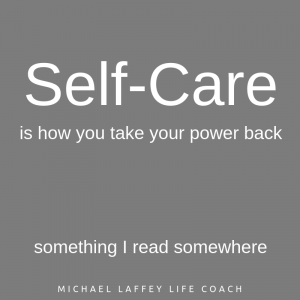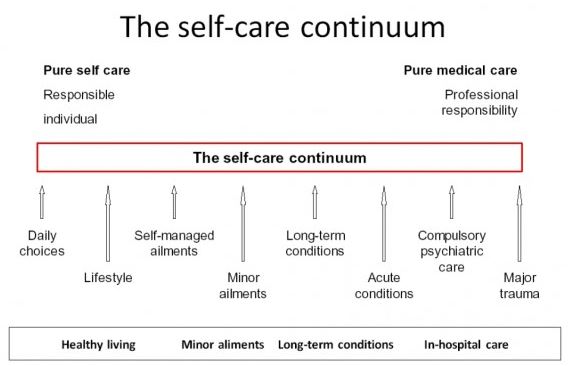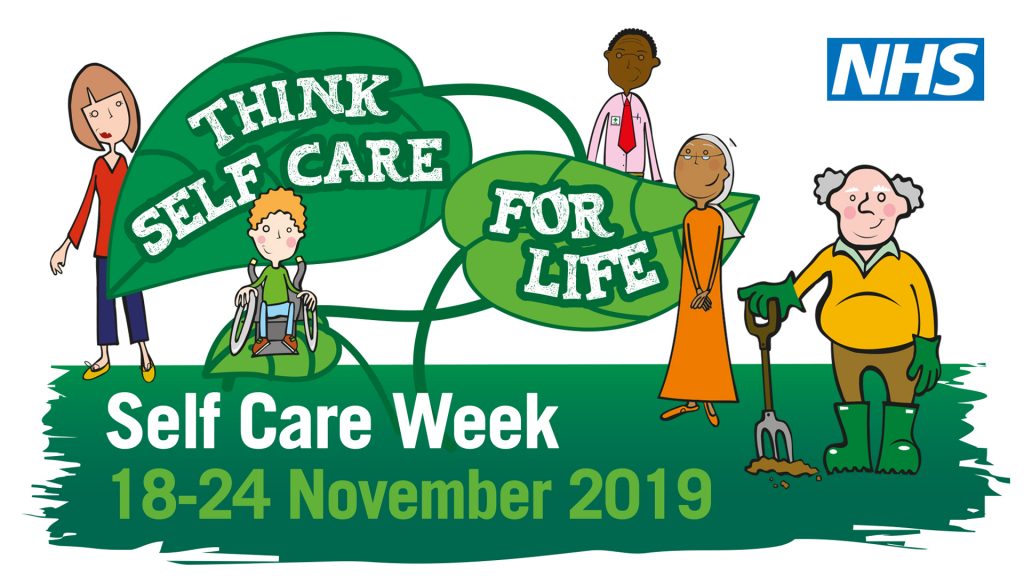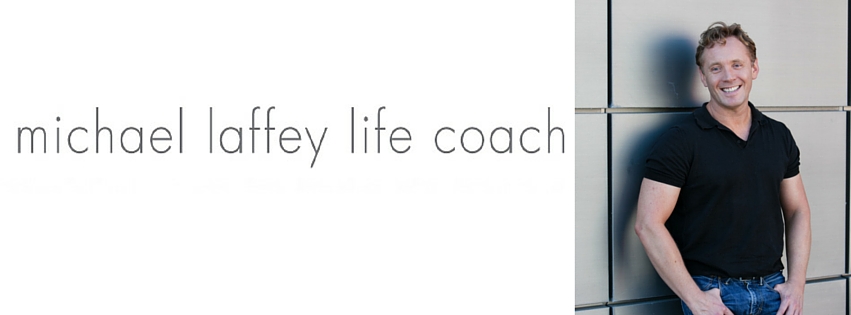It’s Self Care Week – 18-24 November 2019

This week, 18-24 November 2019, is Self-Care Week.
Self-care is deeply subjective and highly personal. We all need to consider what we need to do in order to maintain our levels of mental, physical and overall well-being.
Ditch thinking it’s selfish. Self-Care is essential.
SELF-CARE IS EMPOWERMENT
The key is to understand that self-care is empowerment.
It’s about what we do to feel good about ourselves and our personal situation.
Sometimes we have to remind ourselves that the first step is to take back our power and to put ourselves first.
SELF-CARE CONTINUUM

This excellent graphic from Self Care Forum details the personal to professional levels of help we can apply to our situations.
Where I will personally focus on the individual and personal end of the continuum with an occasional medical issue, people who require much greater levels of medical and professional care to support their well-being, may be asked to consider what they can do as part of their daily choices and lifestyle routines to empower themselves in what may otherwise feel like dependence on others.
WHAT WE CAN TO ENSURE WE ARE SELF-CARING
- Check-out and get some personal time – ongoing physical or mental ailments, work commitments life commitments and people can all add a layer of stress to life that can cloud our judgement. They may well be factors in our stress levels and contributing factors to an illness or condition. How we respond to that requires some objective space to recognise things for what they are and to plot ways to fix it.
- Check-in with self, here are some possible approaches, I tend to use most of them!
- If you can in any way get physical, get physical – get the blood flowing and the joints moving. This ranges from simply getting out of the chair as as frequently as possible, to walking to the shops or to/from a different bus stop, to full on sweaty exercise. These all benefit our physical structure, gets blood circulating to the brain and releases feel good and rewarding hormones. Moving around within a physical space is a great way to unlock rumination.
- Get out in nature – parks, countryside, beach – get out there and feel the difference of being in a natural environment and away from the spot we’re rooted in. Being outside for roughly 20 minutes a day provides us with vitamin D. Stepping outside allows us to breathe deeply, which reduces our stress or anxiety levels. The same goes for those who like to garden or have an allotment. These are all goods way to embrace the changing seasons. This effects how we determine personal progress. People who embrace seasonal change can better manage cycles of change. They embrace the chunk of time to plan outcomes and recognise both progress and change required over time.
- Journaling / diary keeping / jotting down – writing stuff down is a great way to de-clutter the mind. Keeping thoughts in our heads can debilitate us. By getting those thoughts down onto paper we move them into a problem solving space and make sense of them. Scribbling these down can then determine what we can do next. It’s a way of narrating the outcome. It’s not dis-similar to being an author and writing the next chapter.
- Meditation – I didn’t do this for a long time. Then during a particularly bad phase of sleeping I listened to some guided meditations. They worked for me. Meditation is a very useful tool for being able to let thoughts come to the surface without an emotional response. We often tuck things away we don’t want to deal with and these may still be influencing many parts of our overall behaviour. Meditation lets us acknowledge that these factors are there yet knowing that we can mange them less emotionally. Meditation combined with journaling helps me enormously. We measure what matters.
- Eat well – Be aware of the food you’re eating – sometimes the food we eat can influence how we feel both physically and mentally. There’s a growing swathe of evidence that the food we eat influences our gut bacteria and our gut bacteria can influence our mood. Equally, some physical conditions are exacerbated by what we eat. Avoiding certain foods or introducing some that we have eliminated can improve our physical health. Eating well is a mark of our own levels of self-care.
- Ritualise changes in routine or lifestyle – making lifestyle changes isn’t easy. Building routine is a step by step, block by block set of changes we need to do regularly to consolidate results. This allows us to identify differences between where we were and where we are now. Ritualising refers to creating or sticking to specific times or routines which enable the pattern of change to become more natural. For a period of time, creating the routine requires some overt or regimented outlook. Hence, ritual. That’s what I call it anyway. Combined with journalling or some form of regular self check-in can be beneficial.
- Social Networks – have people to socialise with. We all need lighthearted fun from time to time and we also need to share things that are on our mind. We are social creatures, after all. Sometimes a close network of friends encompasses all of this but sometimes we can also target a variety of friends or social groups to answer specific needs.
- Quality sleep – if sleep is proving problematic, know that after just one night’s bad sleep our mental and physical abilities will decline. Quality sleep is essential in our self care routine. It is regenerative at the cellular and physical level, as well as providing the brain time to process and put things to memory properly. Finding quality sleep may require some iterations of change: finding our optimal sleeping hours (for me it’s 7 hours), when to go to bed and when to get up. The main take-away here is that you should wake up somewhere between 6-9 sleep cycles. Sleeping cycles are phases of sleep from light to deep sleep and we should wake up in a light sleeping phase having been though a deep sleeping phase. We’ve all felt very groggy when we’ve woken up very early or very late or “at the wrong time”. Allow yourself to be aware of these. I’ll also be yet another person to state that keeping the bedroom as dark and as free of TV or digital distractions as possible will aid sleep. Blue light from devices keeps us awake. I’ve found I’m more susceptible to this as I get older and I have had to embrace a tech-curfew long before bed. The differences in sunrise in winter and summer will also affect our sleeping patterns. So feel free to re-adjust when you wake up and when you go to bed. Make the bedroom somewhere you want to be. You’re probably an adult and not being told to go to your room as a punishment (although, I never did understand that punishment. It didn’t happen in my house!). Embrace the bedroom as your very own welcoming sleep space. Think hygge.
ALWAYS SEEK PROFESSIONAL HELP
We all need medical and professional help from time to time. And for some people the level of this may be higher for a period of time.
Increasingly, medical care is being personalised. One size does not fit all.
We need to recognise when to ask for professional help. Understanding our own self-care routines is a good way of monitoring that. If something is not working well and we know that we have some usual routine around our self-care, then we have a very good reason to speak to our GP or other healthcare professionals.
Conversely, tt is extremely beneficial to healthcare professionals to recognise that we register our own levels of physical and mental well-being. If they then subsequently diagnose something and they are able to work with us by integrating changes in our self-care we have a collaborative approach with sustainable outcomes.
YOUR SELF-CARE
- What do you do to ensure your levels of self-care regularly?
- Has this article helped you to identify what you need to re-introduce, change or implement?
- Jot down what has come to mind
- Congratulate yourself. You’re taking care of yourself ♥
- Repeat daily ♥



